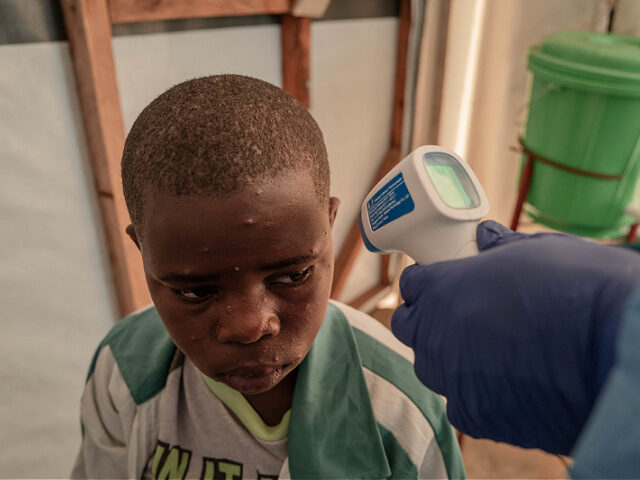The Chinese government has implemented tighter health screening for travelers from Africa, where an outbreak of monkeypox or “mpox” was recently declared a global public health emergency by the World Health Organization (W.H.O.).
China is also stepping up pandemic preparedness drills, which is causing post-traumatic stress among a population that fears the return of the terrible “Big White Men,” the hazmat-suit-clad enforcers of dictator Xi Jinping’s devastating Wuhan coronavirus lockdowns.
The Big White Men reappeared last week in several major cities, including the capital of Beijing and the megacity of Chongqing. City officials said the drills were merely routine preparedness exercises for a hypothetical “pneumonia of unknown cause” — which, unfortunately, is exactly what they said during similar health exercises at the World Military Games in Wuhan in late 2019, right before the Wuhan coronavirus pandemic began.
Some Chinese social media users literally said they were experiencing “post-traumatic stress syndrome” at the sight of healthcare workers in full-body white hazmat suits, even though they have done nothing yet except practice collecting biological samples from a few chickens.
“This is so we can be on a war footing again, right? I think if this happens again, the Chinese Communist Party will bring about its own downfall,” one Chinese social media user said.
Others worried that a new pandemic, or resurgent coronavirus, might already be brewing in China. One of the hottest topics on social media platform Weibo is a fresh wave of coronavirus infections in the city of Guangdong, possibly involving a new variant that is more aggressive about infecting young people. Others are worried about discoveries of anthrax in food shipments to a few Chinese cities.
Some outside observers, such as former Walter Reed Army Medical Center virology researcher Lin Xiaoxu, pointed out that Beijing remains secretive about health information.
“I don’t think they’re doing these so-called emergency drills for no reason,” Lin said. He suspected Chinese officials are trying to cover up a significant anthrax outbreak in the city of Heilongjiang.
China’s new port restrictions, on the other hand, are explicitly aimed at monkeypox. W.H.O. made its emergency declaration last Wednesday, citing the spread of a more aggressive and dangerous strain of mpox than the strain that caused a previous health emergency in 2022.
Chinese customs officials announced on Thursday that tighter surveillance measures would be implemented at ports of entry to block the mpox virus. Travelers from the outbreak region will now be required to report any of the symptoms associated with the disease, including fever, headaches, muscle pain, swollen lymph nodes, and especially rashes.
Chinese customs agents have been ordered to take samples and perform tests on anyone potentially infected by mpox and to sanitize any containers, vehicles, or other goods imported from the Democratic Republic of Congo (DRC) or neighboring states.
The new measures are scheduled to remain in effect for at least six months. South Korea also implemented enhanced screening and quarantine for mpox last week, while other Asian nations are monitoring the outbreak and discussing stronger responses.
South Korea’s enhanced mpox screening was accompanied by a public health education campaign teaching citizens how to check for signs of monekypox infection. Japan has launched a similar awareness-raising campaign.
The Philippines on Monday reported its first mpox case of the year on Monday. The patient was described as a 33-year-old Filipino male who has not traveled outside the country.
“Symptoms started more than a week ago with fever, which was followed four days later by findings of a distinct rash on the face, back, nape, trunk, groin, as well as palms and soles,” the Philippine health department said.
Samples from his rashes were tested when the man reported to a government hospital for treatment, and the results came back “positive for monkeypox viral DNA,” although the strain has not yet been determined.
The European Center for Disease Prevention and Control (ECDC) raised its risk level for mpox on Friday after Sweden identified a lone infection in a traveler from Africa.
“Due to the close links between Europe and Africa, we must be prepared for more imported clade I cases,” said ECDC Director Pamela Rendi Wagner, referring to the new and more dangerous version of monkeypox spreading in Africa.

COMMENTS
Please let us know if you're having issues with commenting.